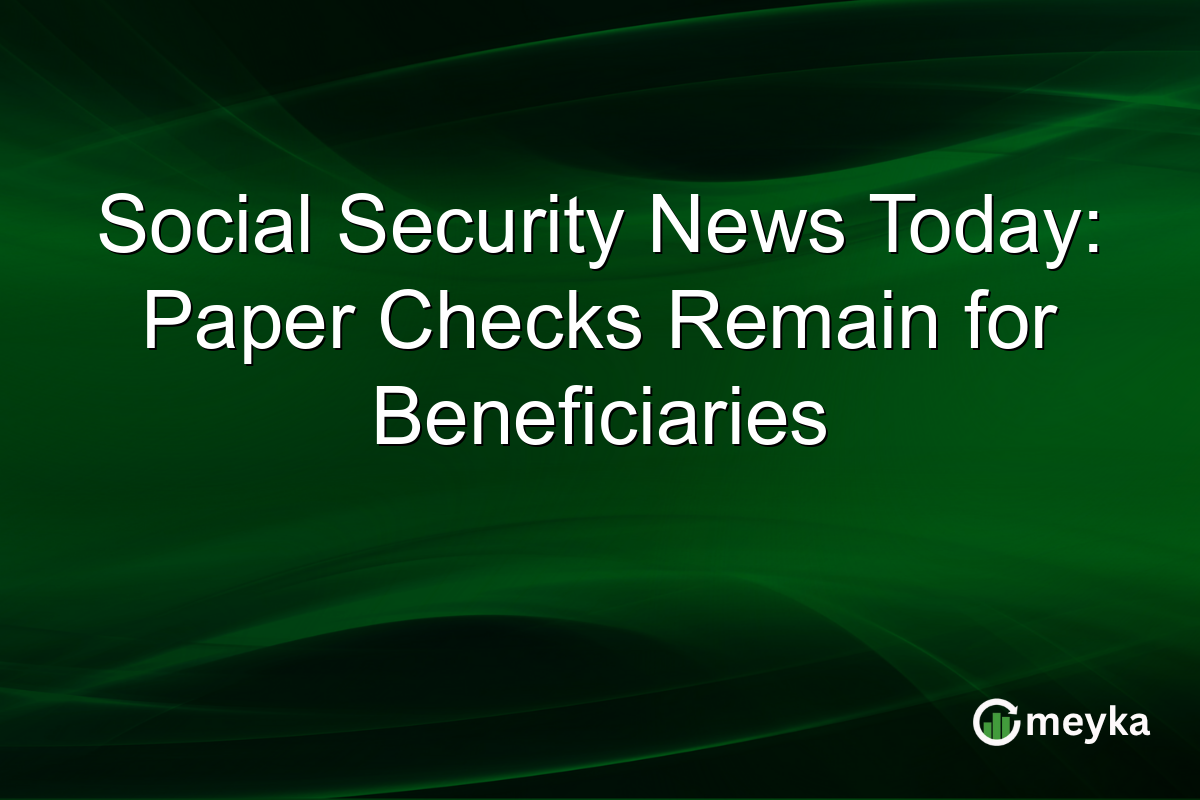Social Security News Today: Paper Checks Remain for Beneficiaries
The U.S. Social Security Administration announced today that paper checks will remain available for beneficiaries, countering recent speculation about an all-electronic transition. This decision affects millions, particularly seniors and those in rural areas, who rely on mailed checks for their social security benefits. As digital payment methods become more prevalent, this move reassures non-digital beneficiaries of uninterrupted access to their government benefits.
The Decision to Continue Paper Checks
The Social Security Administration’s (SSA) decision preserves paper checks for non-digital beneficiaries. This response comes amid discussions for a full shift to digital payment methods. Many seniors and rural residents depend on paper checks, lacking reliable internet access or proficiency with electronic systems.
Recent updates from the SSA indicate that 4 million beneficiaries use paper checks. The maintenance of this option stabilizes these recipients’ access to needed funds without imposing new technical barriers.
External factors have pressured this decision. Advocacy groups emphasize the importance of inclusivity and equal access to government benefit delivery. In doing so, they avoid alienating segments of the population uneasy with digital-only payment methods. For more details, refer to Reuters{:target=”_blank” rel=”nofollow”}.
Implications for Non-Digital Beneficiaries
Non-digital beneficiaries, including seniors and those in remote areas, feel the greatest relief from this confirmation. Having anxious about losing easy access to their benefits, they now face less pressure to adapt to digital payment methods.
This ongoing availability of paper checks ensures these individuals can maintain financial stability without changes to their routine. Moreover, it alleviates concerns over benefit disruptions due to technical issues or lack of digital visibility.
In discussions across social platforms like X, many express gratitude, highlighting how the decision respects beneficiaries’ preferences and needs. Reddit{:target=”_blank” rel=”nofollow”} conversations reflect similar sentiments, emphasizing the need for balance in payment technology advancements.
Economic Impact and Administrative Efficiency
Keeping paper checks could have economic implications and affect administrative efficiency. Paper checks are often seen as an expensive delivery method. Reports suggest additional costs of around $0.80 per check compared to electronic transfers.
The SSA must balance such expenses against needs for inclusivity and equal access. Monitoring by fiscal watchdogs and advocacy groups may prompt evaluations of ongoing costs and efficiency.
Some analysts express concerns over potential administrative burdens as maintaining dual systems can complicate logistics. However, the emphasis on benefiting vulnerable populations tends to outweigh these downsides. To explore these cost concerns, read more at CNBC{:target=”_blank” rel=”nofollow”}.
Final Thoughts
This decision to continue offering paper checks is a significant reassurance for millions of social security beneficiaries. It reflects a commitment to inclusivity, ensuring that those without access to digital methods still receive support seamlessly. While cost and efficiency remain under scrutiny, the overriding priority appears to be maintaining equitable access.
Stakeholders including advocacy groups and government agencies will continue observing the economic impacts. Maintaining this balance between digital and non-digital payment methods fosters social security’s mission to support all beneficiaries effectively. As changes in technology evolve, so might strategies to ensure accessibility without disruption.
Ultimately, the SSA’s choice steadies the path for non-digital beneficiaries, signaling that their needs will remain pivotal in policy decisions.
FAQs
The SSA continues to offer paper checks to ensure inclusivity and accessibility for beneficiaries. Many lack reliable internet or struggle with digital methods, particularly seniors and rural residents. By maintaining paper checks, the SSA avoids excluding these individuals from essential benefits.
Paper checks generally incur higher costs than digital payments, with reports estimating an extra $0.80 per check. Despite these costs, the SSA prioritizes inclusivity and accessibility for vulnerable populations who rely on these checks.
Non-digital beneficiaries, such as seniors and those in rural areas, can receive payments without adapting to digital systems. This ensures continuity in accessing their social security benefits without technical disruptions or new learning curves.
Disclaimer:
This is for information only, not financial advice. Always do your research.






